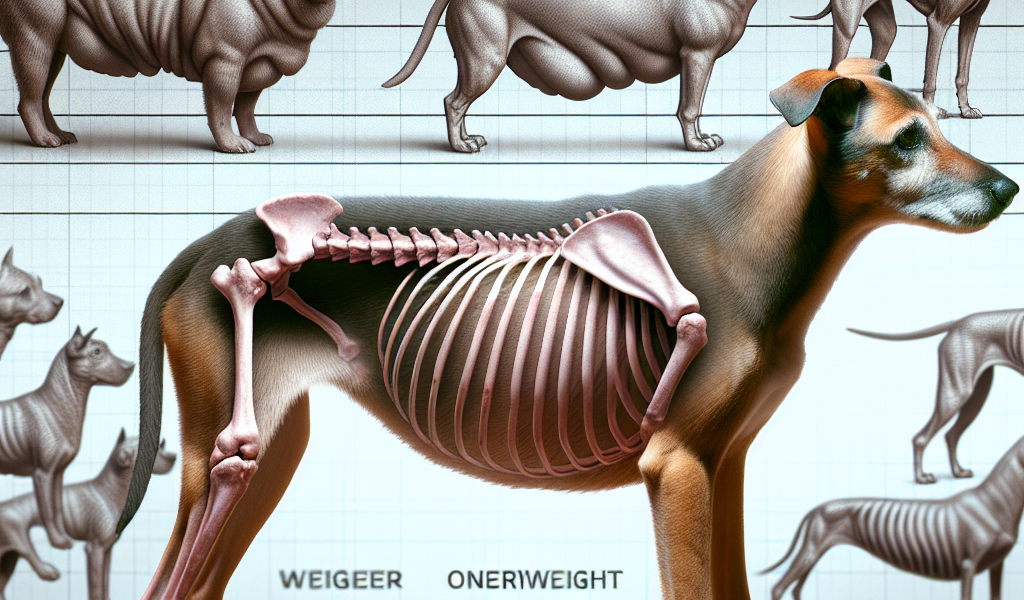Understanding Rapid Weight Loss Concerns in Dogs
Losing weight too swiftly can be as harmful to the health of your beloved pet as it is to humans. In fact, rapid weight loss in dogs can trigger a multitude of health issues that are quite alarming. In this article on “Understanding Rapid Weight Loss Concerns in Dogs”, you’ll get informed about various factors contributing to abrupt weight loss in dogs, what classifies as rapid weight loss in the canine world, and why it’s more than just an aesthetic concern. It will provide a comprehensive insight for you to become more vigilant and proactive about your dog’s health and wellbeing.

Understanding Canine Weight
When we talk about our pet’s health, it is crucial that we consider their weight. But, understanding what constitutes a healthy weight for our dogs is often easier said than done. It’s because just like humans, every dog is unique, with their weight varying greatly depending on factors such as breed, age, and size.
Defining normal weight in dogs
A normal weight for a dog isn’t a one-size-fits-all answer, but instead is dependent on your dog’s breed and age. For instance, a full-grown Chihuahua will undeniably weigh less than a full-grown Golden Retriever. So, how can you discern what an ideal weight is for your dog? A good indicator is to assess your dog’s body condition score, a system that evaluates your dog’s overall body shape and palpable fat coverage.
Identifying overweight and underweight dogs
To tell if your dog is overweight, check if there is any excess fat covering their ribs, hips and waist. You should be able to feel the ribs easily when you touch these areas. On the other hand, if your dog’s ribs, spine, or hipbones are visible or easily felt, they may be underweight. Loss of muscle mass is another telltale sign of an underweight dog.
Factors influencing dog weight
Several factors influence a dog’s weight, including breed, age, diet, exercise, and underlying health issues. For instance, some breeds have a propensity to gain weight, like Labrador Retrievers and Beagles, while others such as Greyhounds and Whippets are typically slimmer. Age also plays a critical part as older dogs may struggle with weight due to a slower metabolism or underlying health issues.
Defining Rapid Weight Loss in Dogs
While variations in weight are normal for dogs, rapid weight loss can be a concern. Here’s what you need to know about this often complex issue.
Perception of rapid weight loss
Generally, if your dog has lost more than 10% of its normal body weight within a short duration, or if the weight loss is due to an unexplained and sudden decrease in fat or muscle, it can be considered rapid weight loss.
Understanding weight loss percentages
Weight loss in dogs is usually categorized by the percentage lost. Generally, a loss of 10-15% of body weight is cause for concern. However, the weight loss might not always be noticeable at a glance- that’s why regular weight checks are important.
Typically observed symptoms
In addition to noticeable weight loss, other symptoms may accompany rapid weight loss in dogs, including a loss of appetite, lethargy, and changes in behavior. If you observe these symptoms, it is best to consult with a veterinarian as soon as possible.

Common Causes of Rapid Weight Loss
Several potential causes can cause rapid weight loss in dogs. Understanding these factors can help you better address and manage the condition.
Illness and disease
Illnesses and diseases, from cancer to heart disease, can trigger rapid weight loss in dogs.
Changes in diet
A sudden change in diet could also be a culprit. If you have recently switched your dog’s diet or if they are not eating enough of their usual food, it could lead to weight loss.
Increased exercise or activity
A sudden uptick in a dog’s activity level or an intensive exercise regime can burn calories faster than they are consumed, leading to weight loss.
Stress and anxiety
Both stress and anxiety can lead to weight loss too. If your dog is feeling stressed or anxious, it may affect their appetite and lead to weight loss.
Illnesses that Cause Rapid Weight Loss
Certain specific illnesses can cause rapid weight loss in dogs.
Parasitic infections
Parasites can interrupt nutrient absorption in a dog’s system, leading to weight loss. Regular deworming can help keep these pesky critters at bay.
Cancer
Cancer is another serious illness that can cause weight loss. This can be due to the disease itself or the associated treatments, which can significantly affect a dog’s appetite and ability to digest food.
Dental issues
Dental issues can often go unnoticed but can cause major problems. Painful teeth or gums can make it difficult for dogs to eat, leading to weight loss.
Endocrine disorders
Endocrine disorders, such as diabetes or hyperthyroidism, can lead to an increased metabolism resulting in weight loss.

Understanding Dog Diets
Ensuring your dog receives a balanced diet is a primary importance to maintain a healthy weight.
Importance of balanced diet
As with humans, diet plays a critical role in a dog’s overall health. A balanced diet, comprised of proteins, carbohydrates, fats, vitamins, and minerals, will keep your dog vibrant and healthy.
Effects of dietary changes
Changes in diet can lead to weight fluctuation. In fact, certain dog foods are specifically designed to help dogs either lose or gain weight.
Dietary causes of weight loss
Poor quality dog food, a reduced food intake, malabsorption, or an increase in parasites can all lead to weight loss.
Role of Exercise and Activity Level in Dog Weight
Exercise and activity level are equally important when discussing weight, both for preventing weight gain and promoting weight loss.
Impact of exercise on weight
Regular exercise not only helps keep your dog fit but also can prevent obesity and associated health problems.
Effects of over-exercising
While exercise is generally good for dogs, too much can lead to weight loss. Finding the right balance exercise regime for your dog is therefore essential.
Importance of regular activity for dogs
Remember, dogs also need mental stimulation in addition to physical activity. Regular play sessions, training exercises, and toys can help keep your furry friend mentally stimulated, reducing the chances of stress-eating or weight gain from inactivity.
Stress and Anxiety-Related Weight Loss
Stress can drastically impact a dog’s eating habits, leading to weight loss.
Signs of stress in dogs
Signs of stress in dogs can include a decrease in appetite, increased sleeping, and changes in behavior.
Relationship between stress and weight loss
If a dog is stressed, they may eat less or even forget to eat, leading to weight loss. On the other hand, some dogs may eat more when they’re stressed, leading to weight gain.
Managing canine stress and anxiety
You can manage dog stress and anxiety by keeping a consistent routine, proper training, giving plenty of physical and mental exercise, and providing love and attention.
Potential Consequences of Rapid Weight Loss
Rapid weight loss in dogs can lead to numerous consequences.
Effects on dog’s physical health
Physically, weight loss can weaken your dog’s immune system, making them more susceptible to illnesses. It can also lead to serious health problems like heart disorders, kidney disease, diabetes, and more.
Effects on dog’s mental health
Mental health is also affected. For instance, anxiety may increase due to the discomfort related to rapid weight loss.
Long-term effects
The long-term effects of weight loss include a decreased quality of life and reduced life span in severe cases. It is essential to address weight loss early to avoid these consequences.
Preventing Rapid Weight Loss in Dogs
There are several ways you can help your dog maintain a healthy weight.
Importance of regular veterinary check-ups
Regular vet visits can help identify any potential problems early and ensure your pet is on track with their health.
Providing a balanced diet
It’s also vital to provide your dog with a balanced diet. Always choose high-quality dog food and give appropriate amounts, so your dog receives all the necessary nutrients.
Maintaining a healthy activity level
Regular exercise will keep your dog fit and help them maintain a healthy weight. But remember, the amount of exercise a dog needs can depend on their age, breed, and health.
Managing stress levels
Keeping a consistent routine and providing a safe environment can help manage your dog’s stress and anxiety levels.
How to Help a Dog Gain Weight Safely
If you need to help your dog gain weight, remember, it’s about healthy amounts and steady increase.
Consulting with a veterinarian
Always consult a vet before deciding to make changes aimed at weight gain. They can provide valuable advice based on your dog’s specific needs.
Implementing dietary changes
A vet may recommend a high-calorie, high-protein dog food, or perhaps adding nutritional supplements to your dog’s diet.
Creating an exercise regime
Building muscle mass through exercise can also be beneficial, but remember the exercise you choose should be appropriate for your dog’s breed and current health.
Understanding your dog’s weight and the role it plays in their overall health is a significant part of responsible pet ownership. By staying vigilant and informed, you can ensure your furry friend lives a happy, healthy life.

